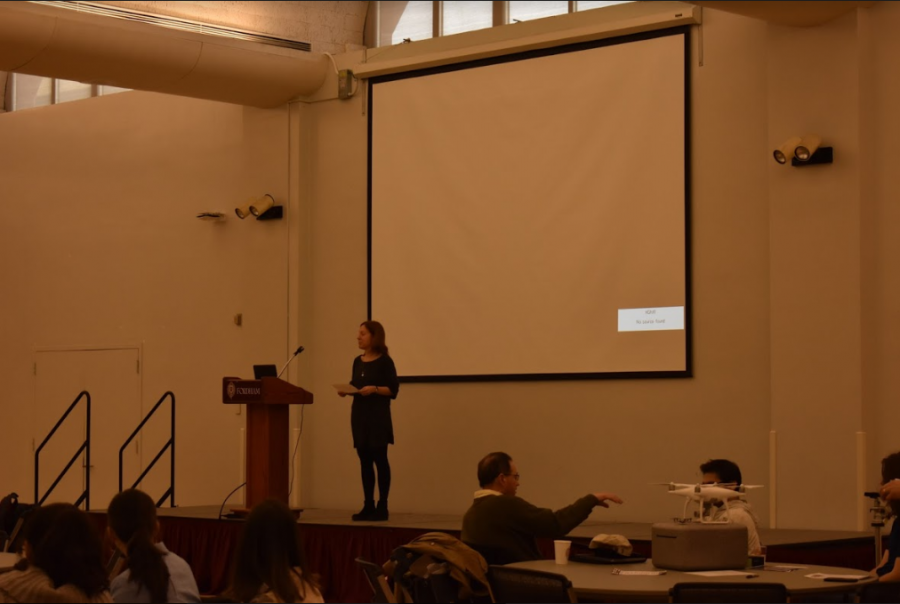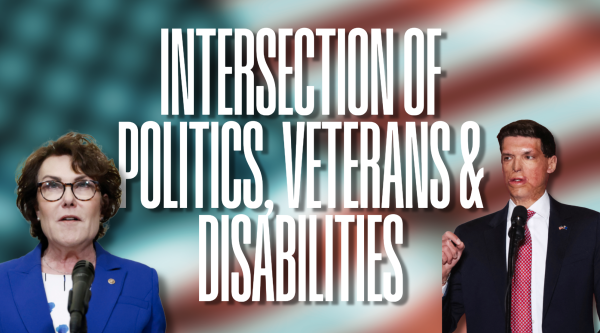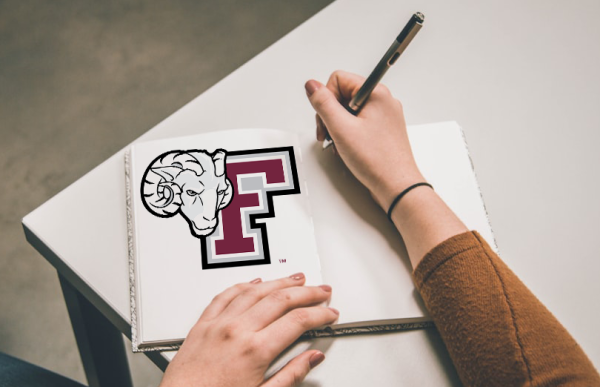FCRH Dean’s Council Hosts Research Reception
By Sarah Huffman
The Fordham College at Rose Hill Dean’s Council hosted its second annual research reception on Wednesday, Feb. 6. The event included formal presentations by faculty conducting research as well as opportunities for students to network with those professors.
“We’re trying to hear what all the professors are working on with research in all different fields,” said Anna Lazaro, FCRH ’21. “Hopefully students can find research they are interested in and try to get involved”
“I’m really just here to see what research is all about,” said Audrey Felton, FCRH ’22. “My major is English, so I know there’s not that many opportunities with humanitarian majors but I just wanted to see what it was like and network with different people.”
Rachel Annunziato, associate dean for strategic initiatives, and Jonathan Crystal, interim provost, made brief introductory remarks.
“I’m here to lend my support to this program,” said Crystal. “This opportunity is for students to meet faculty and make those connections and find out how the can get involved in the research”
Crystal said the event was a great way to support undergraduate research and those that help students pursue it.
“I think it’s a great idea and I’m really just happy to be here to be supportive and to welcome people, not just the students, but Dean Mast, Dean Annunziato, and all the people at FCRH who made this happen,” he said.
After introductions, each guest gave a 5-7 minute presentation on their area of research. Patrick Fox, FCRH ’20, vice president of Fordham College Rose Hill, said they all highlighted the areas where they were looking for undergraduates, which is a new detail this year.
The faculty presenters included Damian Lyons Ph.D., George Demacopoulos Ph.D., Thaier Hayajneh Ph.D., J.D. Lewis Ph.D., Joshua Schrier Ph.D. and Steven Franks Ph.D.
Hayajneh is a professor in the computer science department and works in cybersecurity. He is also the director of Fordham Center for Cyber Security.
His presentation focused on the projects the computer science department is currently working on, including social engineering and blockchain. He concluded by presenting a slide about a scholarship opportunity for students to pursue cybersecurity here at Fordham. Fox said most of his research is sponsored by the NSA.
Demacopoulos, a professor of theology and co-director of The Orthodox Christian Studies Center, said he was invited to speak about a pair of major awards that the center won last year.
“We won over $600,000 in externally funded awards to study the intersection of Orthodox Christianity and human rights and I’m here to talk about that project,” he said.
Lewis presented about Project TRUE (Teens Researching Urban Ecology). Fox said he spoke about how their focus is in botany but they are trying to expand it more, especially toward teens.
Schrier presented on theoretical chemistry and Franks presented on system genomics. His work is sponsored by the National Science Foundation.
“I think the people we brought in brought in these really cool ideas that I hadn’t even been aware were happening at Fordham,” said Fox.
“I thought that was fantastic because there are all these scholarships and grants that these professors are willing to help you get and not a lot of people know about,” he said.
After the professors presented, there were different tables for specific areas of research: one each for biology, theology, chemistry and computer information science. Students were able to talk to professors about their research and research opportunities.
“I think we could have reached more students, but knowing how the event went, the Dean’s Council is ready to make it better next year,” said Fox. “This year’s event had a bigger event space and more presenters, but the turnout was less than the year before.”
Fox said he thinks some of that had to do with the Dean’s Council’s marketing.
He said next year they might try to move away from traditional S.T.E.M. research. “People in humanities departments are doing work that no one knows about,” said Fox. “The research reception is an interesting opportunity for students to learn what their professors are doing.”
He said at the beginning of the year, the Dean’s Council highlighted different areas in the academic experience that could be improved upon. Fox said he brought up research because he thinks it is an area of the university not a lot of people know about and he wants to see more people get involved.
“I think the reason we put this kind of event on is because sometimes it can be intimidating to ask your professor that maybe you’ve known for a few weeks, what kind of research are you working on or can I assist you in the lab,” said Fox.
“With the research reception, it is a casual conversation over lunch where they have already introduced the idea to you in a formal setting but now you have an open opportunity to talk to someone who has expressed interest to work with students,” said Fox. “It makes that process a lot less intimidating.”
The event was sponsored by the chief research officer Z. George Hong, Ph.D., who was one of the people that worked on the event last year. Fox said Hong was a really great resource and organized the presenters.
Fox said he introduced all of the members of the Dean’s Council to Hong because he is doing great work and wants to see other people do the same.
“It’s really fun to plan these kind of events because you get to meet a lot with people that as a typical student you wouldn’t really interact with,” said Fox. “The fun part of planning is getting to talk to people.”















































































































































































































